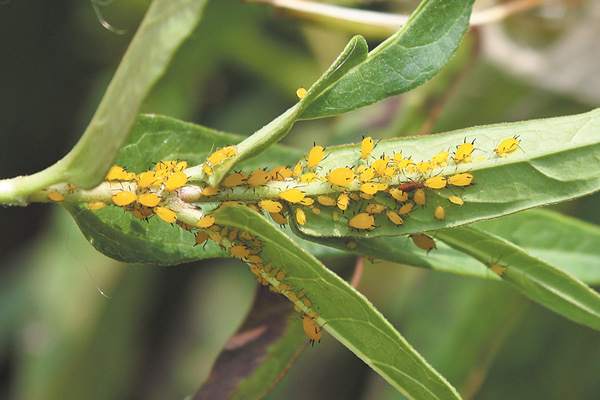Friendly, organic pesticides Go Natural


Aphids and other pests can wreak havoc on your garden. Use environmentally friendly or organic to help protect your crops.
By Pat Fuller
OSU Ext. Master Gardener Volunteer
By now your summer garden should be in full swing.
I have harvested some basil, rosemary, thyme and parsley, but my tomatoes are slow ripening this year.
As I harvested, I realized most of these plants have been attacked by whiteflies.
So I thought this would be the perfect opportunity to look at environmentally friendly or organic pesticides.
The types of pesticides allowed in organic gardening are materials derived or extracted from plants, animals or mineral-bearing rocks.
These materials break down rapidly and are usually less destructive to natural enemies and other organisms.
Several botanical pesticides we could use are: Sabadilla, a dust derived from the seeds of the sabadilla lily.
It is a natural contact poison effective against caterpillars, leafhoppers, thirps, stink bugs and squash bugs. You can find it labeled as Red Devil or Natural Guard.
Pyrethrum is a derivative of the chrysanthemum.
Often another agent is added to pyrethrum to increase insect mortality, as it is primarily a knock-down or flushing agent, because it is highly irritating to insects.
You can find these under the trade names of Pyrenone and Pyrellin.
Do not use in temperatures over 90 degrees.
Neem is derived from the seeds of the neem tree, native to India.
Neem works as an insect- growth regulator, so that treated insects cannot molt to their next life stage, and they die.
It works on leafminers, whiteflies, thirps, loopers, caterpillars and mealybugs.
It is marketed as Margosan-O, Shield-All, Triact and Bio-neem.
Summer oils are a lighter version of dormant oil and are used to control aphids, mites, thirps, scales, mealybugs and their eggs.
However, plant damage can occur if the recommended amount is exceeded, plants have been stressed or temperatures exceed 90 degrees.
Horticultural soaps have much the same effect on insects as the summer oil, but certain plants may be sensitive to the soap, resulting in leaf burn. (Note: Dishwashing soap is not a substitute and can actually damage your plants.)
Diatomaceous earth is mined from the fossilized remains of diatoms.
It absorbs the waxy layer on the surface of insect’s exoskeleton, causing it to dehydrate.
It also works as an abrasive that ruptures the cuticle layer of insects such as slugs, grasshoppers, millipedes and sow bugs; as well as soft-bodied insects like aphids.
OSU Extension does not recommend or endorse any of the products mentioned in this article. The names have been supplied for educational purposes. Always use pesticides with care, be mindful of the precautions, and follow all instructions on the label.
 43
43
